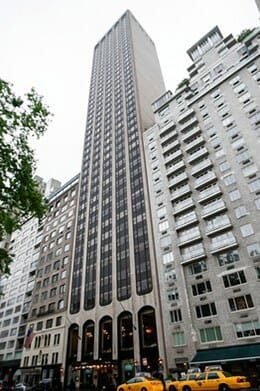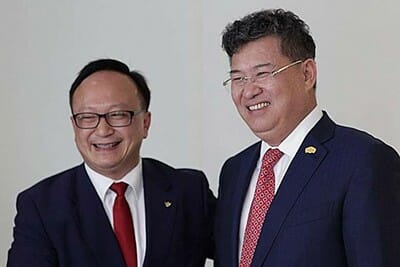
Greenland is buying 41 percent of NYC’s Park Lane hotel in an all-stock deal
One of China’s biggest cross-border real estate investors picked up a 41 percent stake in a residential project to renovate New York’s Park Lane Hotel last week, adding to a portfolio that now covers London, Toronto, Los Angeles, Sydney and several other countries.
Instead of a demonstration of financial might, however, this all-shares investment by a subsidiary of Shanghai-based Greenland Group could show a bottom to the seemingly endless cash pool of one of the mainland’s biggest developers.
Greenland, which last month was also said to be shopping part of the $5 billion Pacific Park project in Brooklyn, packaged this latest acquisition along with the launch of an $8 billion global investment fund, as the mainland homebuilding giant hopes to replace revenue from home sales with cash derived from a newly established investment management business.
Chinese Financing Revives NYC Zombie Project
Greenland picked up its stake in New York developer Steve Witkoff’s Park Lane Hotel project in Manhattan from Kuwaiti investment company Al Waseet International in return for 459,005,021 convertible preferred shares in Greenland Holdings. The deal came just a few months after Witkoff had seemingly thrown in the towel on his planned residential conversion for the Central Park landmark.

Did Chinese financing make Witkoff change his mind?
“The Park Lane project will be developed into a world’s top-notch luxury property project that is estimated to reach a sales income of US$3.6 billion -US $4.3 billion,’ Greenland Group chairman Zhang Yuliang said of the project investment in a statement.
To reach that level of revenue, Zhang is estimated to be targetting prices well above those of even the highest-end projects in the vicinity, according to a report in New York’s Real Deal, or to increase the number of units being built.
The Chinese developer’s investment in the Park Lane project comes just four months after Witkoff announced that he would be shelving plans for the high-end condo conversion, as New York’s luxury residential market showed signs of being past its peak.
“The fact of the matter is, the velocity is not what it was,” Witkoff said of the New York high-end residential market in a January interview with Bloomberg.
China’s Most Aggressive Investor Switches to Asset Light

Greenland Group broke ground on the $1B Metropolis project in LA as part of an unprecedented acquisition spree
Greenland’s effusive praise for its first Manhattan project comes as the developer attempts to unburden itself of growing debts, while keeping the image of a cross-border investment leader.
Starting in Sydney in early 2013, and continuing with its acquisition of the $1 billion Metropolis project in Los Angeles in July of that year, Greenland Group blazed a trail as one of China’s boldest investors, boldly going solo in buying up four projects in Sydney, another in Melbourne, two $900 million projects in London, and a slice of Forest City Ratner’s $5 billion Atlantic Yards project in Brooklyn (since renamed Pacific Place), among other projects.
Despite some strong sales results at its Australian projects, however, this shopping spree has contributed to a growing debt pile for Greenland, just as China’s economy slows, and borrowing becomes more difficult.
Losses Could Be Crimping Greenland’s Deal Spree
Greenland Hong Kong Holdings, the offshore subsidiary that made the NYC acquisition, posted a core loss of RMB 566 million ($86.4 million) during the 2015 fiscal year, according to Danielle Wang, Research Director with DBS Vickers Securities in Hong Kong, with the loss attributed largely to lower-than-expected margins.

Greeland Group chairman Zhang Yuliang (right) announcing plans for a Singapore-listed REIT in March
The company saw its net gearing ratio climb to 172 percent at the end of 2015, up from 155 percent at the end of the previous year, as its short term debt grew to RMB 7.8 billion ($1.2 billion).
On the mainland, Greenland’s Shanghai-listed entity had total debt of RMB 249 billion ($38.4 billion) at the end of September last year – equal to 359 percent of its equity. The median debt to equity ratio for major Chinese developers was 87 percent at the same time interval, according to Bloomberg.
Greenland, which broke ground on Pacific Park together with Forest City Ratner in December 2014, surprised market observers last month when its China-US joint venture was reported to be putting a “very significant” equity stake in the landmark project on the market.
The reported sale of the project stake was preceded in March by the company packaging a number of hotel assets into a proposed $3.24 billion Singapore REIT. The listed offering is now said to be on its way to approval, after Greenland sweetened the initial set of mainland hospitality properties with the addition of a Sydney-based hotel.
Analysts Get Negative on Shanghai Developer
The March timing of Greenland’s REIT announcement coincided with some less encouraging news about the company’s finances from a major credit agency.
Moody’s Investors Service gave a negative rating to Greenland’s debt that month, with analyst Franco Leung noting that, “The high leverage (of Greenland) is due to its rapid business expansion and slow pace of contracted sales collection.”
Adding to the pressure on the company, which is 48 percent owned by the Shanghai government, Bloomberg estimated recently that there is a 6.89 percent probability Greenland will miss debt payments in the next 12 months – the highest level of risk among China’s major developers.
Greenland Hong Kong has a US$700 million bond due to mature in October of this year, with the company said to be preparing a new onshore bond issue to restructure its debt, according to sources familiar with the planned financial offering.
Greenland Wants in on Global Real Estate Capital Market
Greenland’s precarious financial situation is probable cause for the developer financing the Park Lane investment with shares. And the simultaneous establishment of an investment fund with Kuwaiti investment firm Al Waseet International, which sold the project stake to the Chinese firm, shows how the developer hopes to recover its monetary might.
In the same announcement that heralded the real estate deal, Greenland revealed that it was jointly establishing Silk Road Integrated Real Estate Fund (SRIREF) with Kuwait Strategic Investor, the parent firm of Al Waseet.
The decision to branch out into investment management is a new milestone on a path toward becoming a financial services business that Greenland started out on last year.
From Internet Finance to Full-Time Fund Manager
“The transaction marks a significant starting point for Greenland Hong Kong, as a Hong Kong listing platform for the Greenland Group, to formally enter the global capital market,” the company said in a statement.
Greenland and its Middle Eastern partners hope to raise $8 billion for the investment vehicle, in what the mainland firm says is “the turning point for Greenland Hong Kong to adopt a parallel development model that includes property developing, internet financing and asset management to result in its transition from a property developer to a macro asset manager, as well as its implementation of ‘asset light’ strategy.”
This fund management business appears to build on the Internet finance initiative that Greenland kicked off in May 2015. Since that time,the company’s financial service platform has worked together with existing online finance platforms in China, and even set up its own “Greenland Crowdfunding” platform in December 2015.
For this year, Greenland Hong Kong is targetting RMB 20 to 25 billion in online finance transactions, with the business line expected to contribute profits of around RMB 20 million in 2016, according to DBS Vickers’ Wang.
While Greenland Hong Kong emphasised the government-backed “Internet Plus” theme in an attempt to build excitement among investors last year, the company is now banking on being an investment manager to replace declining revenues from housing sales and help pay off its debt liabilities.
The developer has set out to raise $1.5 billion for SRIREF this year, with a standard fee schedule of a 2 percent base fee plus 20 percent in incentives.
However, as with any new business, Greenland’s hopes for riches from becoming a financial services player remain projections in a Powerpoint presentation. Other property players, such as Dalian Wanda, are already pushing investment products and Chinese consumers and private equity investors. Meanwhile the public is growing wary of online investment products after the highly visible failure of Internet P2P lenders such as the $7.6 billion collapse of Ezubo in February.
Leave a Reply